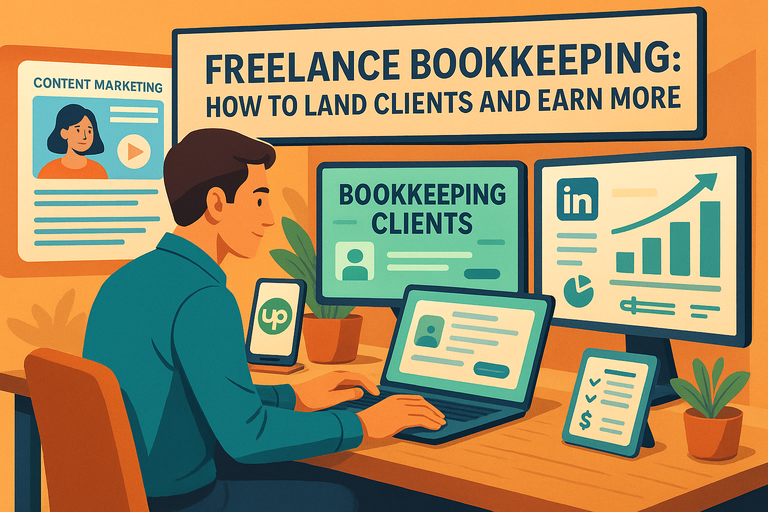Table of Contents
Freelance bookkeeping can be a rewarding way to build independence, flexibility, and steady income, but many bookkeepers struggle with the same question: How do you actually land clients and make more money doing it?
If you’ve ever wondered how to turn your skills into a thriving business, you’re in the right place. I’ll walk you through practical strategies to find clients, set competitive rates, and grow your income without burning out.
Why Freelance Bookkeeping Is a Profitable Career Choice
Freelance bookkeeping has become one of those career paths that balance freedom with financial stability.
If you’ve ever wanted work that you can scale, specialize, and control on your terms, bookkeeping is a surprisingly lucrative choice.
Understand the Growing Demand for Bookkeepers
The truth is, most small business owners aren’t numbers people. They’re busy creating products, handling customers, or trying to grow. That’s why the demand for freelance bookkeepers continues to climb.
I believe one of the biggest reasons is tax compliance—no business owner wants to end up in trouble because they mismanaged records.
From what I’ve seen, more than 60% of small businesses outsource their bookkeeping because hiring an in-house professional is just too expensive. That’s where freelancers step in: you become the affordable yet reliable solution.
Unlike AI-driven accounting software, which can automate tasks but not interpret messy real-world situations, a bookkeeper provides the human judgment that’s still priceless.
Explore Industries That Need Freelance Bookkeeping Services
One mistake people make is thinking bookkeeping is only for retail shops or accountants. The reality is far broader:
- E-commerce sellers who juggle multiple sales channels need someone to reconcile payments from Shopify, Amazon, and PayPal.
- Freelancers and consultants often overlook bookkeeping, then panic during tax season.
- Restaurants rely heavily on bookkeepers to track inventory costs, payroll, and cash flow.
- Nonprofits need clean books to maintain grants and meet compliance requirements.
By niching down into one of these industries, you make yourself instantly more attractive because you “get” their unique pain points.
How Remote Work Trends Create New Opportunities
Here’s where freelance bookkeeping gets exciting: location doesn’t matter anymore. Thanks to cloud-based tools like QuickBooks Online and FreshBooks, you can manage books for a client in New York while sipping coffee in a small town miles away.
I suggest leaning into this trend because businesses now expect virtual services. Remote work also means you can tap into international clients, not just local ones.
It’s not uncommon for a U.S.-based freelancer to handle clients in Europe or Asia, especially in industries with cross-border e-commerce.
How to Identify Your Ideal Bookkeeping Clients
Not every client is worth your energy, and I’ve learned that the hard way. Knowing who you want to work with keeps you from wasting time on clients who underpay, micromanage, or delay invoices.
Define Your Niche Based on Skills and Interests
Ask yourself: What industries excite you? If you’re passionate about e-commerce, dig deep there. If you have past experience in healthcare or construction, use it to your advantage. Defining a niche isn’t about limiting yourself—it’s about making yourself stand out.
For example, positioning yourself as a “freelance bookkeeper for Etsy sellers” is far more powerful than just saying “freelance bookkeeper.” It speaks directly to a client’s needs.
Plus, once you know your niche, you can create resources (like sample charts of accounts tailored to their industry) that show expertise.
Research Small Businesses, Startups, and Solopreneurs
The best part of freelancing is that your potential clients are everywhere. But instead of targeting giant corporations, focus on small businesses and solopreneurs—they’re the ones actively looking for flexible, part-time help.
Here’s a simple method I use:
- Browse local business directories to see who recently launched.
- Check startup boards or LinkedIn’s “Open to Services” tags.
- Join Facebook groups for entrepreneurs where people constantly ask, “Does anyone know a bookkeeper?”
By staying visible in these spaces, you’ll start attracting clients organically.
Spot Red Flags to Avoid Problematic Clients
Let me save you some headaches: not every client is worth the paycheck. Watch out for these signs:
- They resist contracts or want “just trust me” arrangements.
- They dodge discussions about budget or payment timelines.
- They’ve cycled through multiple bookkeepers in a short period.
- They demand constant availability outside normal working hours.
I advise walking away early when you see these patterns. Your sanity and long-term income depend on choosing the right people.
Building a Strong Freelance Bookkeeping Portfolio
Your portfolio is more than a resume—it’s proof that you know what you’re doing. Even if you’re brand new, you can create credibility from scratch.
Create Sample Reports and Case Studies Without Client Data
If you don’t have clients yet, you can still showcase your skills. Generate anonymized or fictional reports in QuickBooks or Excel that demonstrate how you clean up messy accounts, reconcile transactions, or generate monthly financial statements.
For instance, create a “before and after” scenario: one messy spreadsheet, then a polished report showing clear cash flow. This visual impact helps potential clients trust you even before they hire you.
Highlight Software Proficiency in Tools Like QuickBooks and Xero
Clients aren’t just hiring you for manual number-crunching—they want to know you’re fluent in the tools they already use.
That’s why I recommend showcasing certifications (like QuickBooks ProAdvisor or Xero certification) directly in your portfolio.
You can even include screenshots of dashboards you’ve customized (with fake or demo data). This shows clients that you don’t just understand the tool—you know how to make it work for their business.
Use Testimonials and Reviews to Build Trust
Nothing sells your services like other people saying, “They saved me.” Start collecting testimonials the moment you complete even small projects.
If you’re just starting, offer discounted or free bookkeeping for a friend’s side business in exchange for honest feedback.
One trick I use: after delivering a report, I’ll ask, “Would you mind writing one or two sentences about your experience working with me?”
Keeping it simple makes people more likely to respond. Over time, these testimonials stack up into powerful social proof.
Proven Ways to Find Freelance Bookkeeping Clients
Finding clients can feel overwhelming at first, but once you know where to look and how to show up, it becomes much easier. I’ll break down some of the most effective ways I’ve seen freelance bookkeepers land steady work.
Use Freelance Marketplaces Like Upwork and Fiverr
Freelance platforms get a bad reputation for being “race-to-the-bottom” marketplaces, but I’ve found they can work well when you treat them as stepping stones rather than your forever strategy.
Here’s how I’d approach it:
- Create a standout profile. Instead of writing “I do bookkeeping,” position yourself as “I help small businesses clean up messy books and keep taxes stress-free.” That difference matters.
- Upload samples. Include screenshots of anonymized QuickBooks dashboards or reconciled reports to prove you know what you’re doing.
- Bid selectively. Don’t waste time applying to every job. Focus on clients whose descriptions match your skills. If someone says, “I need help reconciling Shopify sales,” and you’ve done e-commerce bookkeeping before, that’s your green light.
I advise using these platforms to build your first few testimonials and get comfortable with remote client work. Once you’ve built credibility, you can gradually move away from low-paying gigs.
Network in Small Business Communities and Local Chambers
Some of the best clients don’t come from the internet—they come from real-world connections. Joining your local Chamber of Commerce or attending small business meetups can open doors that freelancing platforms never will.
When you attend, don’t just shove a business card into someone’s hand. Start conversations.
For example, if a coffee shop owner says they’re stressed about taxes, you might respond with, “I help business owners keep their books in shape so tax time isn’t a nightmare.” That’s enough to plant the seed without being pushy.
I’ve even seen bookkeepers volunteer to give a free workshop on “5 Simple Tips to Keep Your Small Business Finances in Order.” That one session can turn into multiple paying clients who already see you as the expert.
Leverage LinkedIn for Professional Outreach
LinkedIn is one of the most underrated tools for finding bookkeeping clients. Most business owners already expect professional communication there, which makes your outreach feel natural instead of spammy.
Here’s what I suggest:
- Optimize your headline to something clear: “Freelance Bookkeeper Helping Small Businesses Save Time and Stay Organized.”
- Post regularly about simple finance tips, like “3 Things to Check Before You File Taxes This Year.”
- Use LinkedIn search to find small business owners in your niche and send thoughtful connection requests. Always include a short note like, “I specialize in bookkeeping for consultants and thought you might find my content helpful.”
Consistency wins here. Even if someone doesn’t hire you immediately, staying active keeps you top-of-mind when they finally need help.
Attract Clients Through Content Marketing and Blogs
If you’re in this for the long game, content marketing is your secret weapon. Imagine someone Googling, “How do I reconcile Shopify with QuickBooks?” and stumbling across your blog post that answers it step by step. That business owner is now warmed up and more likely to hire you.
I suggest starting simple:
- Write how-to guides around the tools you know best.
- Record short explainer videos and share them on YouTube or LinkedIn.
- Create a simple lead magnet, like a free checklist for “Monthly Bookkeeping Tasks Small Business Owners Should Never Skip.”
The goal isn’t to turn your website into a media empire—it’s to show up where your potential clients are already asking questions.
Setting Freelance Bookkeeping Rates That Reflect Value
Talking about money can feel awkward, but it’s one of the most important parts of running a freelance bookkeeping business.
Setting your rates too low keeps you stuck; setting them too high without proof of value scares people off. The sweet spot comes from strategy.
Decide Between Hourly, Monthly, or Project-Based Pricing
Each pricing model has pros and cons, and the right one depends on your workflow.
- Hourly: Best when projects are unpredictable. Example: a messy set of books you’re cleaning up for the first time.
- Monthly retainer: Great for steady cash flow. You charge a set amount for ongoing bookkeeping, like reconciliations and monthly reports.
- Project-based: Works well for one-off needs, like setting up a new QuickBooks account or preparing for tax season.
I personally recommend moving away from hourly as soon as possible. Clients buy peace of mind, not hours. If you can frame your work as an ongoing service that saves them headaches, monthly retainers make more sense.
How to Research Competitor Rates and Position Yourself
Don’t guess your rates—do some detective work. Look at what other freelance bookkeepers charge in your region and industry. Upwork profiles, LinkedIn services, and even bookkeeping Facebook groups are goldmines of real-world data.
Once you know the range, think about your positioning. If you’re just starting, price yourself competitively but don’t undervalue. If you have certifications, niche expertise, or years of experience, lean into that and charge toward the higher end.
A quick tip: Use anchor pricing. If your goal is $500/month per client, list a $700 package alongside it. The $500 suddenly looks like the reasonable middle option.
Communicate Your Value to Avoid Undercutting
When clients push back on price, it’s rarely about the number—it’s about them not understanding the value. That’s your chance to frame what you do.
Instead of saying, “I’ll reconcile your accounts,” say, “I’ll keep your books accurate so you can avoid IRS penalties and always know how much cash you actually have.” Notice the shift? One sounds like data entry; the other sounds like business security.
I advise building your sales language around outcomes. The more clearly you link your work to saving money, reducing stress, or freeing up time, the less likely clients are to nickel-and-dime you.
Mastering Client Communication and Retention
Landing a client is just the beginning. The real magic is keeping them happy so they stick around for years. Smooth communication and a proactive approach make you invaluable.
Onboarding Clients With Clear Expectations and Contracts
The first week sets the tone for the entire relationship. That’s why I recommend having a clear onboarding system.
Here’s a simple checklist you can use:
- Send a contract that outlines scope, deliverables, payment terms, and boundaries (like communication hours).
- Collect access to financial accounts, software logins, and past records. Tools like LastPass can help share logins securely.
- Create a kickoff call where you walk through your process and answer questions.
Doing this prevents confusion later and shows clients you’re professional from day one.
Use Regular Reports to Show Value Beyond Numbers
Numbers can feel abstract to business owners. That’s why I like turning reports into stories. Instead of just sending a P&L statement, highlight what it means: “Your expenses dropped 15% this month because of reduced supplier costs.”
You can also use visuals. QuickBooks and Xero both let you generate simple charts that make trends easier to digest. Sharing a one-page summary with key takeaways makes clients feel like you’re more than a number-cruncher—you’re a partner who interprets the data.
Build Long-Term Relationships With Proactive Support
Retention comes from showing up before clients even ask. For example, if you notice their invoices aren’t being paid on time, you might email: “I noticed your outstanding invoices are building up—want me to set up automated reminders?”
This proactive approach makes you irreplaceable. Instead of being a line item they reconsider every year, you become part of their business strategy.
I suggest checking in quarterly, even if everything’s running smoothly. A simple message like, “Any new goals or challenges I should know about?” keeps the relationship strong and positions you for upselling additional services down the line.
Tools That Make Freelance Bookkeeping Easier
The right tools don’t just make life easier—they make you look more professional and help you scale. Here are the essentials I recommend every freelance bookkeeper gets comfortable with.
Accounting Software That Automates Daily Tasks
Trying to manage client books manually is a recipe for errors and stress. That’s why I strongly suggest leaning on accounting software.
- QuickBooks Online: This is the gold standard for small businesses. From the dashboard, you can click “Banking > Transactions” and automatically import and categorize expenses. It saves hours compared to manual entry.
- Xero: Sleek and user-friendly, especially for businesses outside the U.S. I like its clean reporting interface—you can generate a P&L in under two minutes.
- Wave: A free option that’s perfect for solopreneurs. It lacks advanced features but works well for basic bookkeeping.
Automations like bank feeds, invoice syncing, and reconciliation reminders cut down on repetitive tasks so you can spend more time advising clients.
Project Management Tools to Stay Organized
Juggling multiple clients gets messy if you rely only on email and sticky notes. Project management software keeps everything in one place.
- Trello: I recommend creating a “Board” for each client, with lists like “To Do,” “In Progress,” and “Completed.”
- Asana: Great for recurring tasks. You can set up a recurring reminder for “Monthly reconciliation” and never miss a deadline.
- ClickUp: Combines task management, docs, and even time tracking in one dashboard.
Keeping your workflow organized shows clients that you’re reliable and detail-oriented.
Secure Payment and Invoicing Platforms
Getting paid smoothly is just as important as doing the work. A clunky payment process frustrates clients and delays your cash flow.
- PayPal or Stripe: Easy to integrate with your website or invoices. Stripe especially shines with recurring payments.
- FreshBooks: This doubles as bookkeeping software and invoicing. From the dashboard, click “Invoices > Create New Invoice” to send polished invoices in seconds.
- QuickBooks Payments: If you’re already using QuickBooks, you can accept ACH and card payments directly in the system.
I advise setting clear payment terms upfront and using automated reminders to cut down on late payments.
Strategies to Scale and Earn More as a Bookkeeper
Once you’ve landed steady clients, the next step is growing your income without burning out. Scaling is all about smarter work, not just more work.
Offer Add-On Services Like Payroll or Tax Prep Support
Many small businesses would rather have one trusted professional handle multiple finance tasks than juggle three different providers.
For example:
- Add payroll processing through tools like Gusto or ADP.
- Offer sales tax filing if you’re comfortable with compliance.
- Provide basic tax prep support, though I advise clarifying you’re not replacing a CPA unless you’re licensed.
Each add-on increases your value and makes it harder for clients to replace you.
Outsource Routine Work to Virtual Assistants
At some point, you’ll hit a ceiling—you only have so many hours in a week. That’s when outsourcing comes into play.
You can delegate repetitive tasks like:
- Data entry
- Receipt categorization
- Scheduling meetings
Platforms like Upwork or Fiverr Business have experienced VAs who can handle these tasks for a fraction of what you charge. This frees you up to focus on high-value work that clients actually pay premium rates for.
Transition Into Advisory Roles for Higher Fees
Bookkeeping opens the door to advisory services, which pay significantly more. Instead of just tracking numbers, you interpret them.
For example:
- Show clients how to cut expenses by analyzing vendor costs.
- Create cash flow forecasts that help them plan for growth.
- Offer budget planning sessions for startups.
When you position yourself as a financial guide, not just a bookkeeper, your income potential skyrockets.
I suggest starting small—add a quarterly “financial health check” to your package, then expand into full advisory services as you gain confidence.
Common Mistakes Freelance Bookkeepers Should Avoid
It’s easy to get caught up in the excitement of landing clients, but some mistakes can cost you money, time, or credibility. Here are the ones I see most often.
Undervaluing Services and Chasing Low-Paying Clients
I’ve seen too many bookkeepers accept “exposure” or $10/hour jobs just to get started. The problem is, once you set yourself up as the “cheap option,” it’s hard to raise your rates later.
I recommend setting a minimum rate that you won’t go below. Remember, businesses are paying you to keep them compliant, organized, and stress-free. That’s worth more than pennies.
Ignoring Compliance and Data Security Requirements
Bookkeeping isn’t just about numbers—it’s about trust. Clients are handing you sensitive financial data, and mishandling it can damage your reputation permanently.
- Use secure password-sharing tools like LastPass.
- Avoid sending sensitive data over unencrypted email.
- Stay updated on tax laws and compliance rules for your region.
Even small slip-ups here can be costly, so it pays to be cautious.
Skipping Marketing and Relying Only on Referrals
Referrals are fantastic, but they shouldn’t be your only source of clients. If you stop marketing when business feels “busy enough,” you’ll face dry spells later.
I suggest keeping at least one ongoing marketing activity, whether it’s posting on LinkedIn once a week, writing blog posts, or running simple ads. Marketing consistently keeps your pipeline full so you’re not scrambling when a client suddenly drops off.
Expert Tips to Stand Out in the Freelance Bookkeeping Market
The bookkeeping field is competitive, but the good news is most freelancers blend into the crowd. With a few strategic moves, you can make yourself stand out.
Specialize in a High-Demand Industry or Niche
I believe niching down is the fastest way to become the go-to bookkeeper. For example, specialize in:
- E-commerce bookkeeping for Shopify and Amazon sellers
- Nonprofit bookkeeping with grant tracking
- Construction bookkeeping with job costing
By focusing on one niche, your marketing, portfolio, and testimonials all speak directly to the right audience.
Invest in Certifications to Boost Credibility
Certifications aren’t everything, but they do send a clear signal of professionalism. Programs like QuickBooks ProAdvisor or Xero Certification take a few hours but make a huge difference in client trust.
I advise displaying these badges on your website, email signature, and LinkedIn profile. They’re not just pieces of paper—they’re conversation starters with potential clients.
Consistently Market Yourself to Stay Top-of-Mind
Marketing isn’t about being flashy—it’s about being visible. Even if you’re not actively chasing clients, keep showing up.
- Share simple finance tips weekly on LinkedIn.
- Send a monthly email newsletter with “3 Quick Money-Saving Tips for Small Businesses.”
- Record short videos answering common bookkeeping questions.
When clients are finally ready to hire, they’ll think of you first because you’ve been consistently in their orbit.






